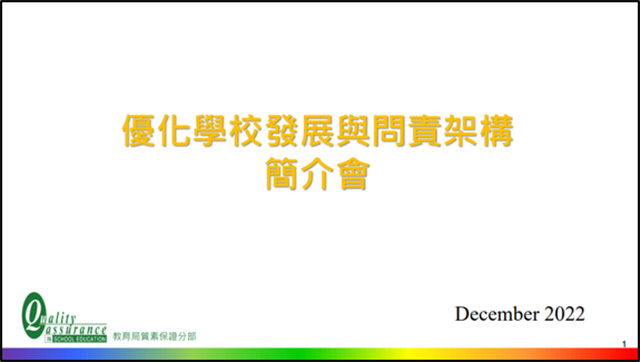The Enhanced School Development and Accountability Framework
Suggested learning time: approximately 1 hour
The School Development and Accountability (SDA) framework was introduced by the Education Bureau (EDB) in the 2003/04 school year in supporting schools to implement school-based management (SBM). The framework emphasises that school self-evaluation (SSE) is a core element of schools for their perpetual improvement. SSE, complemented by school inspections (including External School Review and Focus Inspection), helps promote continuous self-improvement in schools through putting in place a systematic Planning-Implementation-Evaluation cycle. Building on the experience gained from the existing SSE and making reference to the suggestions made by the Impact Study on the Implementation of the Current Phase of the SDA Framework for Enhancing School Development in Hong Kong, EDB has further enhanced the SDA framework to strengthen SBM.
(1) Presentation slides
Briefing session on the enhanced School Development and Accountability framework
(Chinese version only)
[82 pages]
Questions
1. What are the differences between the enhanced SDA framework and SDA framework?
Please refer to pages 15 - 16 the presentation slides “Briefing sessions on the enhanced School Development and Accountability framework”.
2. Why does SSE have to focus on the seven learning goals?
Please refer to pages 21 – 26 of the presentation slides "Briefing sessions on the enhanced School Development and Accountability framework".
The Curriculum Development Council sets the seven learning goals of primary and secondary education according to Hong Kong’s aims of education and directions of curriculum development. The seven learning goals set out the qualities desired for students at different key stages of learning. School work, including those under the domains of “Management and Organisation”, “Learning and Teaching” and “School Ethos and Student Support” in Performance Indicators for Hong Kong Schools (PI), contributes to nurturing the desired qualities of the seven learning goals for students. It is reflected in student performance on “Attitude & Behaviour” and “Participation & Achievement”. Hence, when schools use the seven learning goals as the focus for reflection in conducting SSE through the Planning-Implementation-Evaluation cycle, they are able to use PI, as well as SSE information and data in an integrative manner to holistically evaluate how good they are, in order to strengthen their work in nurturing the desired qualities of the seven learning goals in students. For instance, schools generally should strengthen the work related to “national identity” and “healthy lifestyle”, for fostering whole-person development and lifelong learning of students.
3. What are the refinements to Key Performance Measures (KPM) for tying in with the SSE under the enhanced SDA framework?
Please refer to pages 56 - 63 of the presentation slides "Briefing sessions on the enhanced School Development and Accountability framework".
KPM is a set of key data for SSE, which is built on the framework of the PI. Under the enhanced SDA framework, the framework of updated KPM remains unchanged and continues to comprise four domains in accordance with the PI.
To tie in with the education development trend and enhance the effectiveness of SSE, new items and sub-items are added in the KPM to achieve an SSE focusing on the seven learning goals. Schools can integrate, interpret and use the enriched KPM data, together with the other data and information of schools more readily to conduct SSE.
Suggested Follow-up Activities
SMC Chairperson and SMC members may read Education Bureau Circular No. 15/2022 “The enhanced School Development and Accountability framework”[6 pages] before the SMC meeting and reserve 20-30 minutes in the meeting to discuss how the school implements the new items in the KPM.

